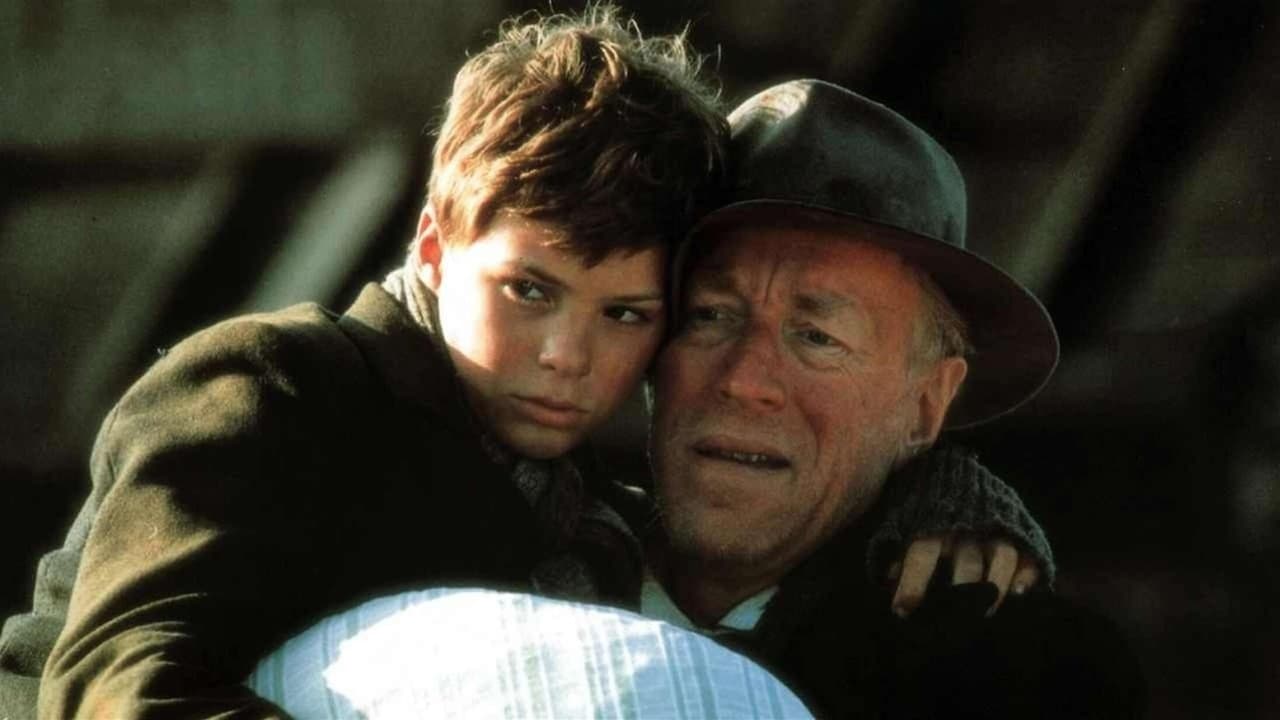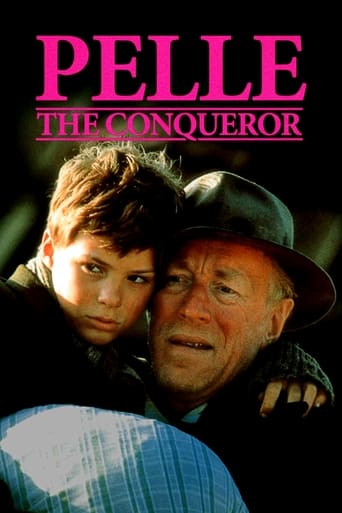



Wonderful character development!
SERIOUSLY. This is what the crap Hollywood still puts out?
View MoreDreadfully Boring
I wanted to like it more than I actually did... But much of the humor totally escaped me and I walked out only mildly impressed.
View MoreI wanted to really like this. I really did. Luscious scenery, amazing long shots, admirable mise en scène, lovely cinematography. Excellent acting from the two main actors. First, the well known Max von Sydow as a frustratingly timid father that we somehow hate while loving. Through Sydow's skilled performance, we can see how much he loves his son, yet not enough to overcome his cowardliness. Then we have young Pelle, played by Pelle Hvenegaard. No, not a complete coincidence. The actor was actually named after the character he is playing; the film is based on Martin Andersen Nexø's 1906 novel by the same name, Volume 1/4. Maybe this motivated the actor to give such an impressive debut performance. Aside from all this, however, the sum is less than its parts. This coming of age story has very little humor and even less moments to truly smile during. One terrible thing after another, the only predictable thing being that something else bad or worse is sure to come next. I have never been one to demand or even ask for fairy tale endings. Indeed, I actually appreciate the more realistic examinations of life. Unfortunately, there is a right way to do this and a wrong way to do this, and somehow "Pelle the Conquerer" fell short. During the course of the film, young Pelle is tormented by his schoolmates and humiliated by the apprentice overseer; a girl gives birth to her employer's son's bastard child and is dragged off to prison for murdering it; the son, who really killed the baby, sacrifices himself while trying to rescue a ship in a storm; some new emigrants turn up frozen to death in a boat, the local mutant halfwit lets Pelle whip him with stinging nettles for half a crown; the only rebellious farmhand gets bashed in with a rock and turned into a shuffling retard; the landowner's miserable wife lobs her husband's penis (Yes, you read correctly); Lasse thinks he will have a cushy berth married to a comfortable widow but her husband comes back alive; the halfwit runs away to the sideshow; the schoolmaster drops dead in class and Pelle finally decides enough is enough and leaves through the snowy wastes to an indefinite future chronicled in three more books and presumably future films. Except there are no other films; only the books.The result is a film that was not paced well, with many what the ? moments and a whole lot of depressing ones. The good did not outweigh the bad in this film that could have been far better.
View MoreDanish screenwriter, producer and director Bille August's fifth feature film which he co-wrote with Danish author and screenwriter Bjarne Reuter, Swedish author Per Olov Enquist and Swedish author Max Lundgren (1937-2005), is based on the first part of a tetralogy novel from 1906-1910 by Danish writer Martin Andersen Nexø (1869-1964). It premiered in Sweden and Denmark, was screened In competition at the 41st Cannes International Film Festival in 1988, was shot on location in Sjælland and Bornholm in Denmark and is a Sweden-Denmark co-production which was produced by Danish producer Per Holst. It tells the story about Pelle and his father whom he calls Lassefar who during the late 1800s travels from Tommelilla in Sweden to the Danish Island of Bornholm with a group of Swedish emigrants in the hopes of a better life and ends up living in a barn at a place called Stengården which is managed by an exploitative boss and his complaisant son.Finely and precisely directed by Danish filmmaker Bille August, this quietly paced fictional tale which is narrated from multiple viewpoints though mostly from the main character's point of view, draws a tangible and heartrending portrayal of a relationship between a widowed middle-aged man and his adolescent son, a degrading manager and his unruly employee and a young woman and man who's romance is damned and forbidden by the man's father due to their class differences. While notable for it's naturalistic and distinct milieu depictions, fine production design by production designer Anna Asp, exquisite cinematography by Swedish cinematographer Jörgen Persson and fine costume design by Swedish production designer and costume designer Kicki Illander, this character-driven and narrative-driven story which examines themes like survival, human dignity, friendship, prospects and the human condition, depicts two empathic and interrelated studies of character and contains a good score by Swedish composer Stefan Nilsson.This historic, at times romantic and literary coming-of-age tale which is set in the late 19th century on an Island in the east of Denmark in the Baltic Sea, is impelled and reinforced by it's cogent narrative structure, substantial character development, subtle continuity, various characters and the reverent acting performances by Swedish actor Max Von Sydow, Danish actor and writer Pelle Hvenegaard in his debut feature film role, Swedish actor Björn Granath, Danish actress Astrid Villaume (1923-1995) and Danish actor Thure Lindhardt in his second feature film role. An epic, humane, atmospheric and heartfelt period drama from the late 1980s which gained, among numerous other awards, the European Film Award for Best European Actor Max Von Sydow at the 1st European Film Awards in 1988, the award for Best Young Actor in A Foreign Film Pelle Hvenegaard at the 10th Youth In Film Awards in 1989 and the Palme d'or at the 41st Cannes Film Festival in 1988.
View MoreThis is a difficult film to review, because it is pretty much all of its ingredients, so the best description of it would either be fifteen pages or fifteen words."The grass is greener" describes the motif pretty well.The usual description leads one to think it is totally about "Pelee", but that isn't the case. Many characters and many plots are in this film.I watched it with some expectations. Max von Sydow is one of the most respected names in acting, and even when he appears in high action apocalyptic films, there is some bit of "thinking" involved.We usually expect Sydow to be involved in works that are "mystical puzzles", such as "The Seventh Seal" and "The Reward".But sometimes, like this film, the film is about "reactions". In fact, two things that I was always conscious of while watching this were the title and the "reactions".Why was it called "Pele the Conqueror"? We come to that at the end.As for the "reactions", that too is a omen of the ending. The characters don't "think things through". They simply react.And that does give a very realistic view of the times and the people. It is a story of the hopes of people on a Scandinavian stone farm in the late 1800s. Don't be fooled into thinking that this is a dull "slice of life" film, though.I am not the most patient viewer, maybe a bit "attention deficit", but this film kept me interested throughout.I could say more, but then I wouldn't know where to stop. Hopefully, this review gives an idea of what to expect. It has good scenery, and is well made. I feel comfortable in saying that nearly everyone will be pleased by it, and most will be more than pleased.
View MoreAt the end of the 19th century, Lasse and Pelle, father and son, cross the sea separating Sweden from Denmark in pursuit of prosperity and happiness. Lasse, a middle-aged widower, promises his son that in the new country there's work with high wages and 'kids are free all day.' It's the illusions of a hopeful emigrant. In reality they land in Denmark to work almost as slaves at a farm, bound to the owner by a poorly-paid contract that doesn't allow them to leave until they've fulfilled its term.Bille August's Pelle The Conqueror is harsh. It's a movie about crushed illusions, xenophobia, class differences, power, economic submission, and the cost of freedom. It's not an easy, uplifting movie.There are two character studies at the center of the film. We've all met Lasse in our life. We all know someone who is cowardly but prone to boasting, who complains about his boss but never stands up to him, who drinks when life doesn't suit him, who makes plans but never does anything to fulfill them. Max Von Sydow gives a great performance as Lasse; he has that rare ability to subtly change his facial expressions from moment to moment, which fits Lasse's mood swings, and he speaks volumes just with his eyes. To play Lasse, a frail middle-aged man, the actor adopts a stooped frame with slow movements, accentuating his weakness. This is one of those rare performances when an actor loses himself in the role he's playing. Max Von Sydow alone is reason enough to watch this movie.Pelle Hvenegaard, who was 13 at the time, also gives an excellent performance. Pelle is the main character and Hvenegaard holds his ground when he shares a scene with the veteran actor. Pelle is his father's opposite: introspective and a sharp observer. In the farm a lively man called Erik (Björn Granath), fills Pelle's head with new dreams about America and convinces him to save his money so the two can go together. It may turn out to be another disappointment, but it's what keeps Pelle going. Unlike his father, he hasn't lost hope.This is the conflict at the heart of the film. The scene the two actors share when Pelle asks his father to leave with him is an amazing example of acting, contrasting the two personalities perfectly, Lasse's fear of the unknown against Pelle's determination to change his life.Besides portraying this conflict, the movie also captures the hardships and cruelty of the farm and community they live in. Right from the start they're discriminated for being Swedes, whom the Danish forearm considers a dumb people fit only for manual work. The foreman dictates the terms, he decides who can rest and when, he threatens rebels like Erik with the police. Pelle's life is even worse because he can't get along with his schoolmates. His only friend is Rut, the bastard son of farm owner and a local peasant. The movie is very critical of the ruling class too, showing its indifference and aloofness. A quick subplot neatly demonstrates the consequences of a farm girl and the son of a landowner falling in love.Ironically, the film is beautiful to look at, especially when the camera lingers over endless ice-covered fields. There's an atmosphere of stillness and peacefulness. Bille Auguste captures all the beauty of the landscape around the farm, even if it's a deadly landscape, where men can freeze to death during winter. Even when the movie is beautiful its ultimate message seems to be: life is difficult.Pelle The Conqueror fascinates me because it's not a distant reality it depicts. Who doesn't know what it is to have dreams crushed because of circumstances beyond our control? To be afraid of taking a chance? To submit to and confront authority? To accept life's unexpected pleasures as they come to us? Lasse and Pelle, two opposite approaches to life – resignation or hope – are always with us. This movie is harsh but not harsher than ordinary life.
View More